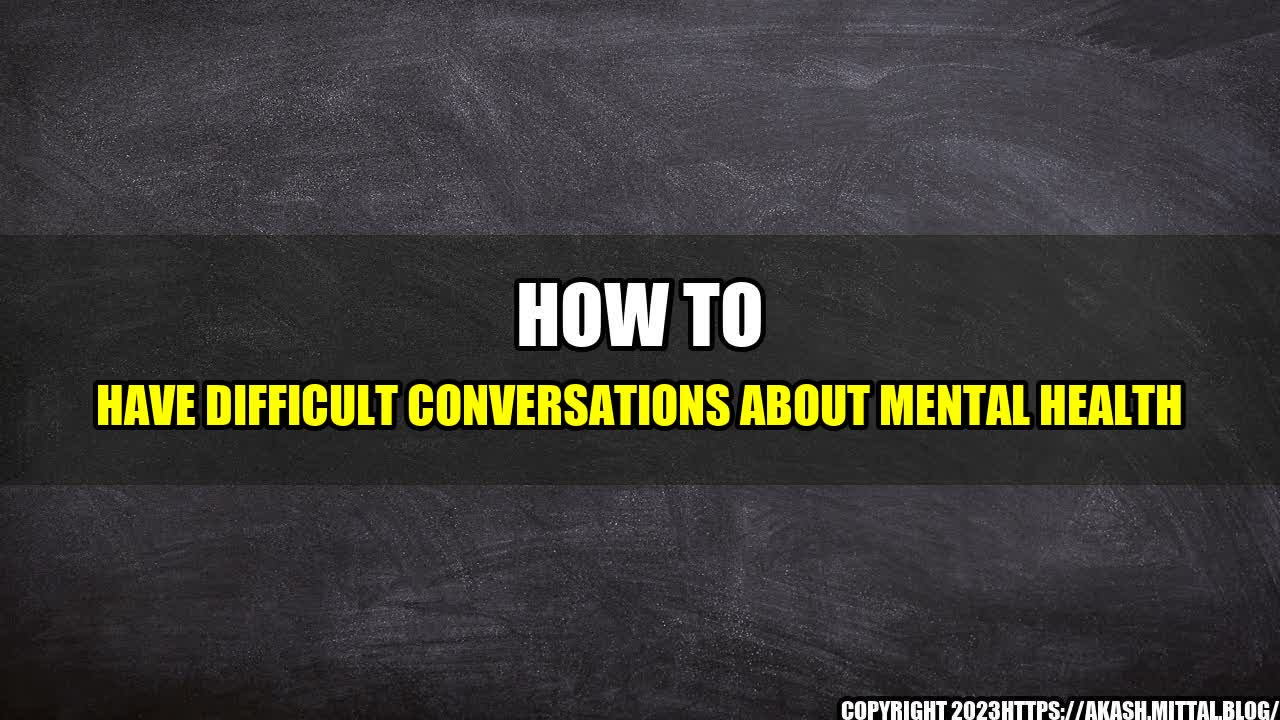It's not always easy to talk about mental health, but according to experts, it's an important conversation to have. Mental health conditions affect millions of Americans each year, and many go undiagnosed and untreated. This can have significant consequences, including decreased quality of life, impaired relationships, and even suicide.
As a parent, it's especially important to be able to talk about mental health with your children. Mental health conditions can develop at any age, and early intervention can make a big difference in a child's life. However, many parents struggle to broach the topic with their kids.
So, how can you have difficult conversations about mental health with your children? Here are some tips from parenting experts and mental health professionals:
1. Start with Yourself
If you're going to talk to your children about mental health, it's important to make sure you're in the right headspace first. Think about how you feel about mental health and try to identify any biases or misconceptions you may have. Reflect on your own experiences with mental health, and be aware of your own triggers and vulnerabilities. If you're not comfortable talking about mental health, don't force it. It's okay to take some time to work through your own feelings before broaching the topic with your kids.
It's also important to model healthy behaviors and attitudes around mental health. This can include seeking help when you need it, taking care of your own mental health, and avoiding stigmatizing language or attitudes.
2. Educate Yourself
Before you talk to your children about mental health, take some time to educate yourself on the topic. This can help you feel more confident and prepared when broaching the subject. Some resources you may find helpful include:
- Mental health websites and blogs
- Books and articles about mental health
- Mental health professionals, such as therapists or counselors
- Mental health advocacy organizations
It's also important to approach mental health conversations with an open mind. Try to avoid imposing your own beliefs or assumptions on your children, and be willing to listen to their perspectives and experiences. Remember that mental health can be a nuanced and complex topic, and there may be no one-size-fits-all solution.
3. Be Proactive
Finally, it's important to be proactive when it comes to mental health conversations. Don't wait until there's a crisis to talk about mental health with your children. Instead, make mental health a regular part of your family's conversations. You can bring up the topic in casual ways, such as asking your children how they're feeling or talking about stress management techniques. You can also use teachable moments, such as news stories or movies, to broach the topic. By making mental health a regular part of your family's dialogue, you can help reduce the stigma around mental health and prevent the development of more serious conditions.
In conclusion, having difficult conversations about mental health can be challenging, but it's an important topic to discuss with your children. By starting with yourself, educating yourself, and being proactive, you can help your children develop healthy attitudes towards mental health and prevent the development of serious conditions.
As a mother of two teenagers, I know firsthand how difficult it can be to talk about mental health. However, I also know how important it is. Both of my children have struggled with anxiety and depression at various points in their lives, and learning how to talk about mental health has been a crucial part of their recovery.
One technique that has worked well for me is to use everyday activities to start conversations about mental health. For example, I'll ask my children how their day was while we're prepping dinner, and if they mention feeling stressed or overwhelmed, I'll suggest some relaxation techniques like deep breathing or mindfulness. This has helped them develop healthy coping mechanisms and has also made mental health a more approachable topic for our family.
References and Hashtags
For more information on mental health and parenting, check out the following resources:
- National Alliance on Mental Illness: https://www.nami.org/Support-Education/Mental-Health-Education
- American Academy of Child & Adolescent Psychiatry: https://www.aacap.org/AACAP/Families_and_Youth/Facts_for_Families/Home.aspx
- National Institute of Mental Health: https://www.nimh.nih.gov/health/topics/index.shtml
Hashtags: #mentalhealthawareness #parenting #mentalhealth #mentalhealthmatters
Category: Parenting

Curated by Team Akash.Mittal.Blog
Share on Twitter Share on LinkedIn